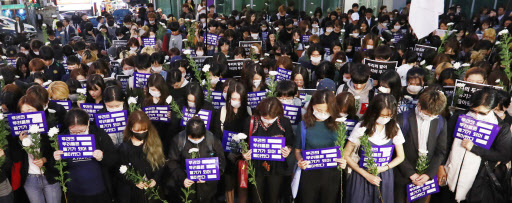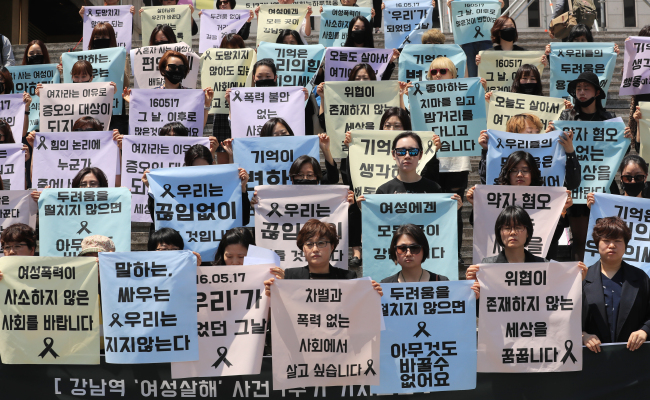[From the Scene] 1 year after Gangnam murder, fight against misogyny rages on
By Park Ju-youngPublished : May 17, 2017 - 22:18
As usual, the street outside Gangnam Station is bustling with people busily going about their day.
But a year ago here, a young woman met the tragic end to her life at the hands of a knife-wielding stranger -- a man who hated women.
At dusk Wednesday, the first anniversary of the killing, hundreds of people, mostly women in their 20s and 30s, silently marched across Gangnam in tribute to the 23-year-old victim who was stabbed to death by a man in a unisex public bathroom.
But a year ago here, a young woman met the tragic end to her life at the hands of a knife-wielding stranger -- a man who hated women.
At dusk Wednesday, the first anniversary of the killing, hundreds of people, mostly women in their 20s and 30s, silently marched across Gangnam in tribute to the 23-year-old victim who was stabbed to death by a man in a unisex public bathroom.

“The murder forever changed my life. It was a chance for me to wake up to the seriousness of misogyny and discrimination in Korean society,” Suh Jung-hyun, a 19-year-old university student told The Korea Herald.
“Before the murder, I was not happy about having to be careful at night just because I was a girl. But I did nothing because I thought I couldn’t help it,” she said while marching with a friend. “I now gained courage to take action to fight the injustice in solidarity with others.”
The murderer was a 34-year-old man, surnamed Kim. He waited for about 50 minutes in the restroom, while six men entered and left, before he killed the first woman who entered the bathroom, according to CCTV footage.
Kim said he had committed the crime because he had been “ignored and belittled” by women many times in the past.

After the incident came to light, exit 10 of Gangnam Station transformed into a memorial site with people leaving flowers and written notes to mourn the death of the young woman and express their anger toward violence targeting women.
A year after the killing, justice has been done. The murderer is locked up in prison, where he is to stay for 30 years.
Yet, many mourners who gathered felt their fight against misogyny and hate crimes had a long way to go.
“I still fear violence against women. It will not change anytime soon,” said 28-year-old Bae Un. “Safety cannot be achieved through regulation. Safety for women can only be achieved through the social perception that men and women are equal.”
Male participants sympathized with the women, too.
“I will never fully know what it is like living in fear of being killed because of my gender. That’s why I will make more of an effort,” said Kim Jae-ho, a 23-year-old student. “This is not only a woman’s problem. It is about making a society where human rights are respected.”
Mostly dressed in black, the participants were holding flowers and handwritten messages on sticky notes, which they later left outside exit 10 of Gangnam Station. Following the march, people shared their stories of rape, violence and discrimination.

Earlier in the day, women’s rights activists held a press conference at Gwanghwamun, central Seoul and, as part of a performance, silently held up posters reading messages such as “Since the day, we are changing” and “For women, everywhere is Gangnam station.”
“Women have changed. The way we perceive the male-dominated society and resist discrimination has changed,” women’s rights activist Kim Hui-yeong said. “It was a chance for women to stand up for their own safety and equality.”
Many pro-women groups were created based on social media by young women identifying themselves as feminists. They were at the forefront of pressuring the government to scrap its plan for a tougher ban on abortion, among other actions.
“But society has rarely changed,” Kim said, criticizing the government’s short-sighted measures to prevent hate crimes against women.
Since the murder, municipalities stepped up efforts to install more CCTV cameras and alarm bells and set up separate public bathrooms for men and women to prevent a recurrence of such crimes.
“That’s not the point. We are suffering from hatred, discrimination and violence in our daily lives at home, at school and at work,” she said. “CCTVs cannot prevent misogynic crimes. The key is to raise awareness, especially among policymakers. There should be awareness that women are equal to men and they don‘t need to be subjected to special protection.”
A passerby, who left a message of support in respect to the victim, hoped for an easing of conflict between men and women.
“For the past year, hatred and conflict between men and women has intensified. It is true that I am still worried about my girlfriend being outside at night and there is still discrimination against women, like in the job seeking process,” said Nam Kun-hee, 21, a university student.
At the height of the outpouring of grief and anger, tension spiked between extremist groups of men and women, particularly on the internet.
As police concluded the murder was a random crime by a mentally disturbed man, not a hate crime, there was criticism of police attempts to cover up the misogyny prevalent in society.
Some radical men shot back, accusing women of treating them as potential criminals.
“I just hope that both men and women can coexist in harmony without being discriminated against in Korean society,” Nam said.
By Ock Hyun-ju (laeticia.ock@heraldcorp.com)










![[Hello India] Hyundai Motor vows to boost 'clean mobility' in India](http://res.heraldm.com/phpwas/restmb_idxmake.php?idx=644&simg=/content/image/2024/04/25/20240425050672_0.jpg&u=)








